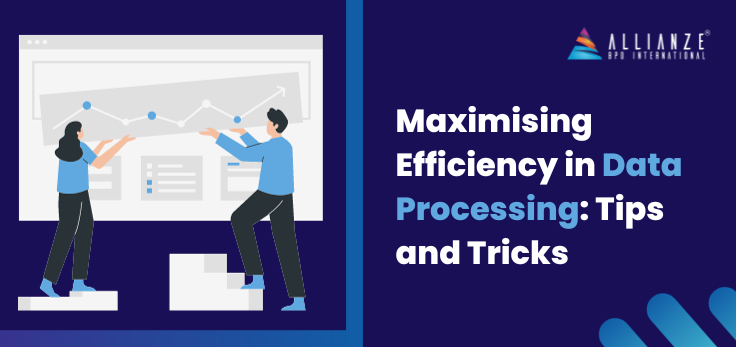
Data processing is the technique of gathering raw data and changing it into a usable form. It contains various phases. Data processing benefits various sectors including data scientists, business analysts, C-suite decision-makers, and IT managers. Irrespective of the end-user or the task, the ultimate aim of data processing is to turn data into information.
Data is of different forms including images, numbers, transactions, graphs, and survey answers. It is split into personal information, financial transactions, banking details, etc. Depending on the kind of details you need to gather and the kind of data you want to access, the time duration for processing or steps can alter. All these forms require some kind of processing. As the majority of industries are making use of data, data processing is inevitable. Therefore they depend on various business process outsourcing companies to streamline their operations. As the demand increases the number of data processing companies is also increasing. In order to become the best data processing service company among multiple companies, you have to implement certain tips and tricks in your processes.
But before getting into the tips and tricks, we must know some basics about data processing. So let's get into it.
Significance of Data Processing
Data processing helps in the following ways:
- Generate Reports Easily – You can create reports, dashboards, and other summaries of its features, once the dataset processing is effectively finished.
- Effective Storage – The data is put up in relational databases after processing. This helps to easily store, handle and analyse using database tools including SQL.
- More Accurate – Eliminating outliers, errors and unwanted data points enhances the accuracy of the insights.
- Enhanced Productivity – As it is effortless to navigate, data processing prevents users from reprocessing a dataset heavily, whenever they have to use them.
Application of Data Processing
Data processing is applicable in various industries of different sizes. Below are the common applications of data processing:
- Commercial data processing
- Real-world data applications
- Data analysis
Tips and Tricks in Data Processing
Know your data
There are different types of data and they include, ratio, interval, ordinal, and nominal. Among these, the data in which we can divide the values are known as ratio data. And the data in which we cannot divide the values but we can add or subtract the values are known as interval data. Also, the data in a natural order but the difference between each category is not specified is known as ordinal data. When it comes to nominal data, each category is different. But you cannot define it mathematically.
Make your data calculations
There are different types of calculations including creating new variables by multiplication and division, creating new variables by addition and subtraction, briefing continuous data in integer categories, converting integer data to text categories, and converting text data to integer categories.
Ensure your data is sensible
An effective way to check whether the data is sensible is to calculate descriptive statistics on each variable, and this should be done for all the data types.
Standardisation
Once the data processing is over, data is stored in some file formats like an Excel sheet. Then it should be stored in a standard form so that accessing it becomes effortless.
Monitoring and feedback
Manual data processing needs close monitoring and evaluation regularly. Feedback should be a two-way communication where we adopt remedial measures to eliminate errors. For future referencing of process optimisation, you should document the observations. This method helps reduce manual efforts and boost your profits.
Planning
Every task requires proper planning to execute it effectively. Data processing is also not different from this. Each stage such as data collection, data preparation, data input, data processing, data output, and data storage requires effective planning to gain the best outcome.
Accuracy
When the data processing is over, it is necessary to quality-check the whole process. It helps a long way in mitigating errors in data. You must ensure that the data is error-free and double-check whether you missed any data during the process. The client will be expecting an outcome that is accurate and of high quality.
Software
The most common and effective software set for data processing is Microsoft Excel, Google BigQuery, Amazon Web Services, Hortonworks, Cloudres, and Snowflake.
Different Types of Data Processing
There are various types of data processing. According to your requirement, budget, and size of the business you can choose the appropriate one:
- Batch Processing – Helps in processing bulk amounts of data. Payroll systems use batch processing.
- Real-time Processing – It aids in processing smaller sets of data soon after the system receives the inputs. Withdrawing money from ATM is an example.
- Online Processing – It is helpful in the continuous processing of data. This benefits in scanning barcodes.
- Time Sharing – It is useful in housing various users using a particular computer resource. In this, it is possible to process data in time slots.
- Multiprocessing – It breaks down data into frames and processes it with more than two CPUs in the same system. Multiprocessing is also known as Parallel processing. It is useful for weather forecasting.
So, these are the major types of data processing. To know more about the significance of data processing and how it helps businesses connect with [email protected]. Outsource data processing services to us, we have experts in the field to assist you efficiently.